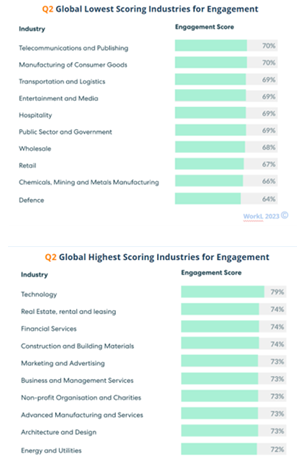Employees are getting happier with age, and millennials are on top in Q2 in the latest work insight report by employee experience platform WorkL.
WorkL’s Q2 Employee Experience Insight Report 2023 is taken from over 25,000 employees globally during Q2 of 2023 from the free WorkL Happy At Work Test and it reveals globally that employees are happier as they are getting older, with millennials taking the top spot. Globally employees aged over 25 are now scoring in the 70% mark for overall happiness at work when compared to last quarter. Those aged 25-34 now score 70%, 35-44 score 72% and those aged 45-54 score 71%. When compared to Q1 employees aged 25-34 score 69%, 35-44 score 70% and workers aged 45-54 score 70%.
LGBTQ+ employee sentiment
Unfortunately, globally there is a decline in overall employee engagement for workers identifying as LGBTQ+, with a score of 67%, down from 70% in Q1. Last quarter saw LGBTQ+ employees score better than Heterosexual employees (67%) who now score 71%. When broken down to UK scores, there are similar scores of 65% for both groups of employees, significantly down when compared globally which should be a red flag for UK based employers to act on.
Disabilities in the workplace
It’s good news when looking at employees with disabilities in the workplace globally. Employees who have a disability are now happier than they were in Q1, 70% globally (up 4 percentage points from Q1) and 68% in the UK, (up 4 percentage points from Q1). Again, the UK is lagging behind the global scores which paint a prettier picture.
Men are from Mars….Women are from Venus
Overall employee engagement scores have increased for both female and male employees, both globally and for UK workers. Globally in Q2 men are happier by 3 percentage points, scoring 73% whilst women are scoring 70%. Compared to Q1, men were at 69% and women scoring the same, 70%, therefore over the last three months men have seen a bigger increase when compared to women.
UK male employees now score 69% when they previously scored 68%- again a trend for men to be happier when comparing Q2 to Q1. Women in the UK are 1 percentage point happier compared to three months ago, at 69% vs 68%.
Lord Mark Price, Founder of WorkL comments on the news: “Our Q2 report shows that it’s good news when looking at our data from a global perspective, but there’s work to be done for UK employers who are lagging behind global averages when it comes to employee engagement and experience. More needs to be done for employees identifying as LGBTQ+ as we reflect on Pride month and again, the UK has more work to be done with disabled employees. This snapshot of Q2, when compared to Q1 is a good marker to see how we are doing with employee engagement as we reach the halfway mark of the year. This report should act as a list of focuses and priorities for employers for the remainder of the year.”
Happiness by sector
Other news from the Q2 report highlights similar results to Q1 in terms of which sector is scoring well and which sector is scoring poorly at employee engagement. This quarter however there is a steep decline in overall workplace happiness within the Entertainment & Media sector, down over 4 percentage points globally to 69% and for the UK it’s currently at just 66% compared to 71% just three months ago.

Given the energy crisis, globally employees working in the Energy sector are now much happier than they were three months ago, now scoring 72% compared to 67%. UK workers in this sector are still less happy than their global peers but are happier when compared to last quarter (66% Q1 vs 69% Q2).
It’s no surprise that the Tech sector takes top spot again with (globally) 79% compared to 74% three months ago. We also see the Travel & Leisure sector increase positively in the UK by 4 percentage points to 72%, just as the holiday season kicks in.
Flight Risk
Q2 saw the Flight Risk increase globally to 31%, up from 28% just three months ago. This means that nearly one in three employees are looking to leave their current job as retention continues to be a struggle for many organisations. The UK remains at 28%, similar to its score in Q1 and its overall score of 27% for 2022. Industries most at risk this quarter for the UK include those working in Agriculture (38%), Defence (35%), Retail (36%) and new to the top of the list, Entertainment & Media with 35%.
View the full report here.


